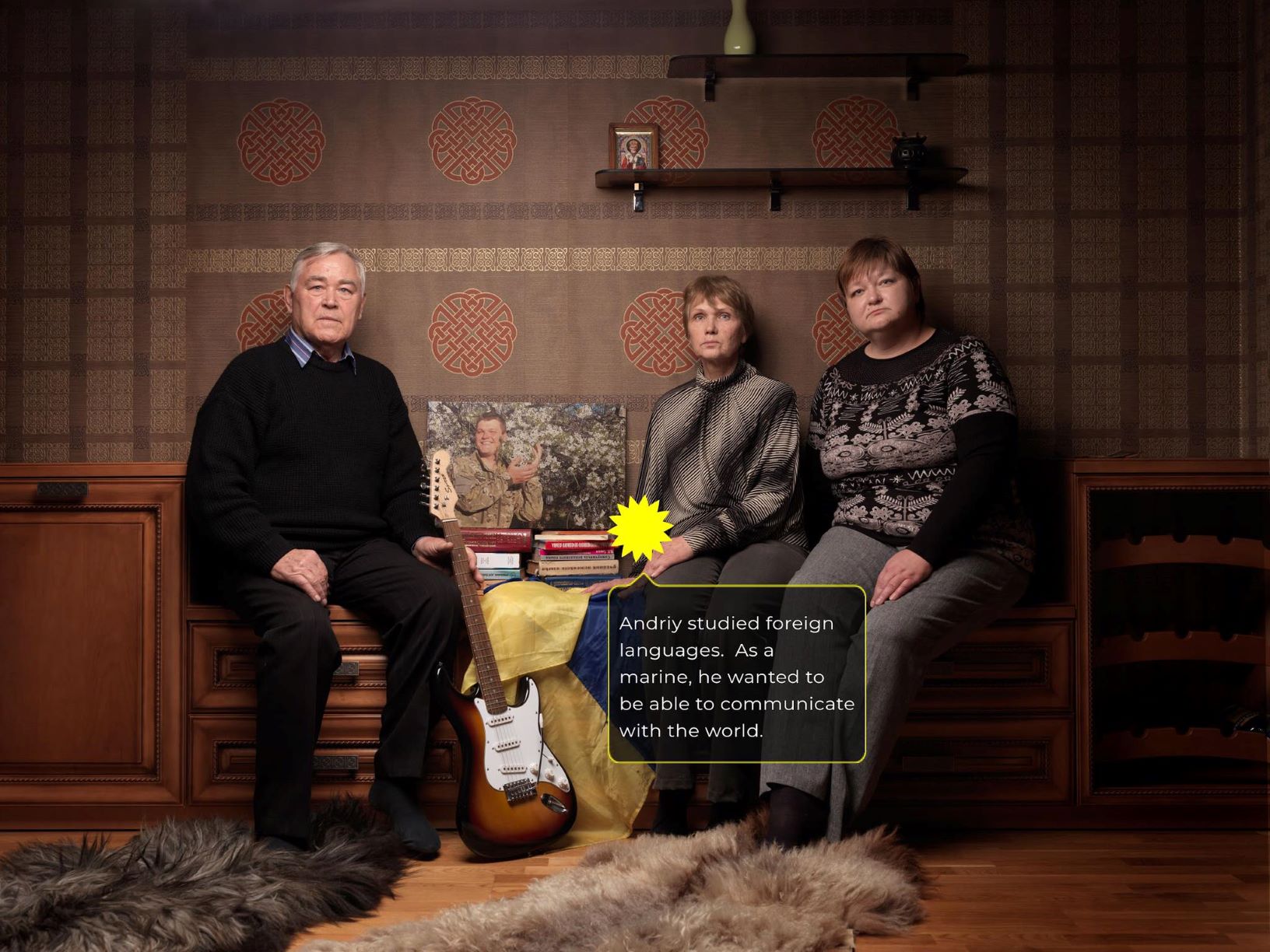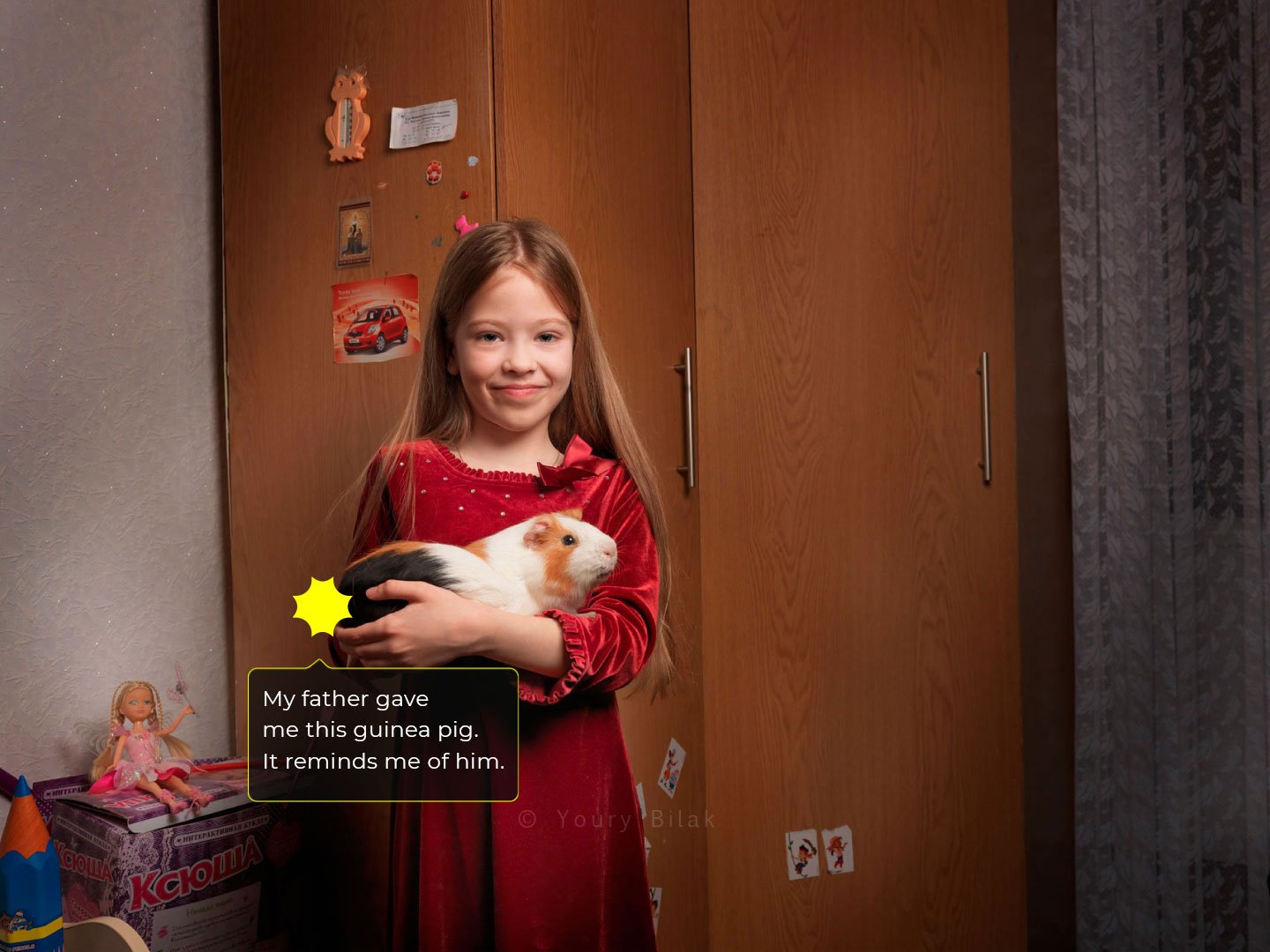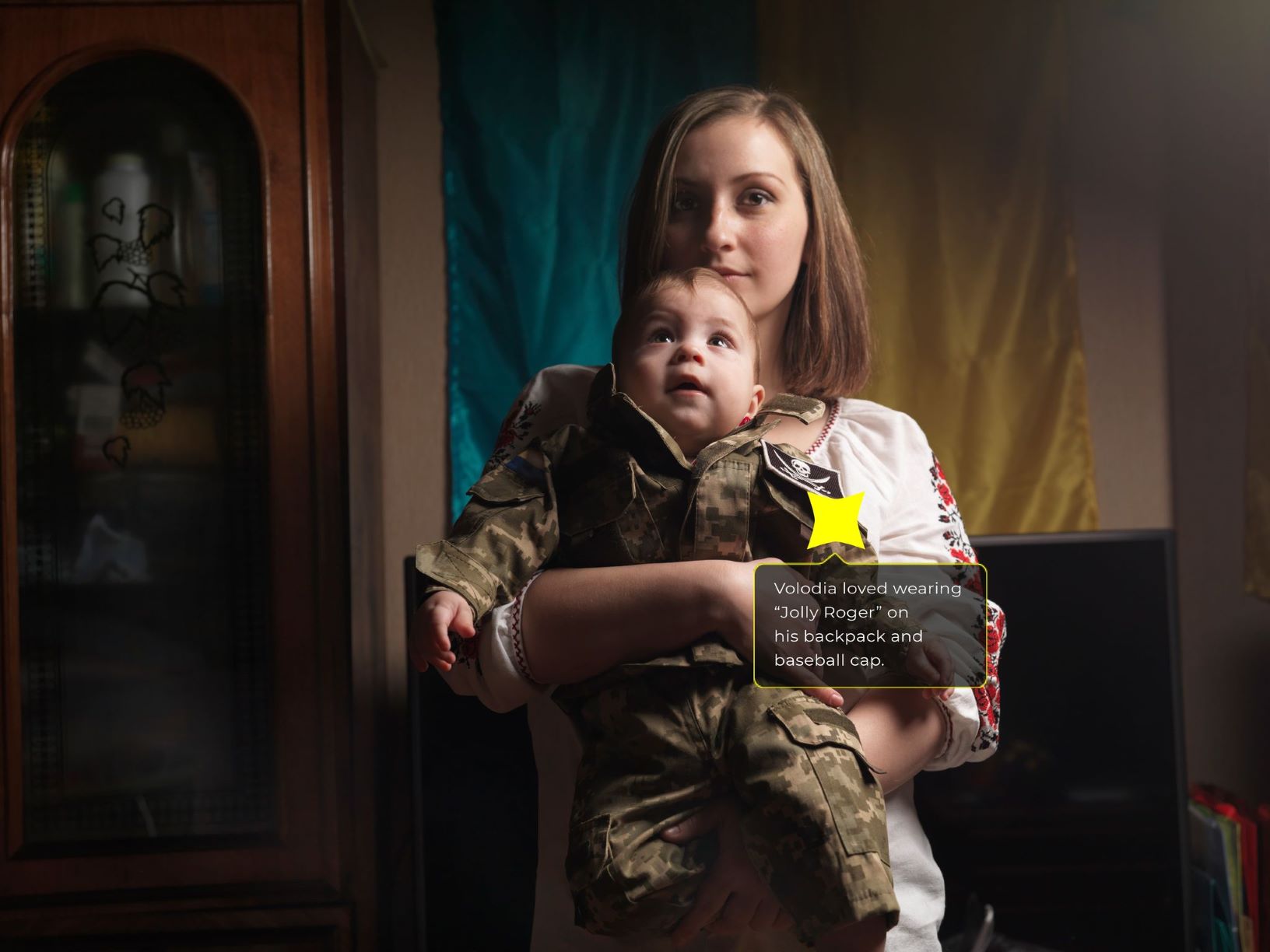It is part of the Plus 1 project created to memorialize the fallen Defenders of Ukraine.
Sviatoslav Serhiyovych Horbenko
Author: Oleksandr Mykhed
Son
Sviatoslav Horbenko was born on December 26, 1994. His birthday is inextricably linked to Catholic Christmas, which is always celebrated in the family.
Sviatoslav was an exceptional child.
When he was very young, he would notice things that others didn’t. This really astounded his parents.
For example, he was able to readily find his mother’s misplaced earring.
Or he used his extraordinary talent to help his father, Serhiy Oleksandrovych, a well-known Ukrainian anthropologist, to make a unique discovery while working in France in the early 2000s.
Student
Sviatoslav had another gift that was often mentioned by other people. He loved to learn and understand new things, search for the essence of something, and master new skills and knowledge.
He went to school at the age of 5, graduated at the age of 15, and thanks to his brilliant results in the final exams, he could choose among the best universities in the country.
Sviatoslav was gifted in everything he did.
He could whip up a lemon pie to surprise his mother, or learn to play the guitar. Or study English, French, Polish and Japanese.
In Kharkiv, he studied at two universities: Anglo-Japanese philology at the Skovoroda National Pedagogical University, and distance learning at the Faculty of History of the Karazin National University.
He had an amazing memory and a talent for languages and history. Dates, names, facts… he had absolutely no trouble remembering details.
After the Revolution of Dignity, Sviatoslav enrolled at Kyiv National University, where he took 17 exams in additional transfer work. Seventeen exams!
Later, Sviatoslav’s friends told his parents that he’d taken up fencing in Kharkiv for two years.
He often did this. For example, he got a job to support himself during his studies.
He wasn’t trying to hide anything from anyone. Let’s just call it modesty and steadfast calm in a man who knew exactly what he was doing.
Activist
During the Revolution of Dignity, Sviatoslav joined the Kharkiv Self-Defence Unit. Many events happened then; clashes and fights with enraged, hate-filled people, too.
Sviatoslav’s father was also there, helping to save the lives of the Maidanivtsi in Kyiv. When Sviatoslav came to visit him on the Maidan in Kyiv, he didn’t want to be photographed against the backdrop of the Maidan. He was modest and simply said: “Dad, I wasn’t here. I don’t deserve it.”
Family
Then, he moved to Kyiv and took all those exams. A few months of studies… and the war broke out in the Donbas. Sviatoslav’s parents told him to finish his studies. Another year, another course. One day, Sviatoslav realized what was really happening and who was behind it all; he couldn’t stand it anymore and told his parents that the Russian mercenaries and militants would never let him finish his studies. They’d advance and reach Kyiv.
War had already happened in his family.
Sviatoslav’s family was composed of three branches - Ukrainian, Polish and Lithuanian. Some time ago, his ancestors from each family branch were forced to go to war. For example, his 17-year-old grandfather went to the front in 1941 and returned home when he was 22.
Warrior

On August 17, 2014, Sviatoslav left for the front line. He left a letter for his parents.
What was in that letter? He wrote that he’d decided what he wanted to do.
Father and son met in early September at the Desna military training centre.
Later, his father recalled that for the first time he had felt the mature wisdom of a young warrior.
What did they say to each other?...
“Dad, they will never let anyone finish their studies.; they won’t leave Ukraine until the Ukrainian people themselves fight back and counter this invasion. Sooner or later, we’ll all have to fight! Don’t try to take me back home, away from my brothers. They’re leaving tomorrow and I’m going with them. I can’t leave them. That’s not possible! They’ll leave and I won’t…? I know all of them; they’re my friends, while later, I’ll have to leave for the war zone with total strangers.”
The 13th Warrior
That’s the name of Sviatoslav’s favourite movie, released in 1999 by John McTiernan, who also directed the American action film Die Hard.
What’s the film about?
It’s about a band of 13 Viking warriors who defend their lands against a tribe of humanoid cannibals who believe they possess the spirits of bears. They dress in skins of slain animals, worship their totem Bear, annihilating defenceless people: the elderly, women and children.
One of these courageous warriors is called Skeld. Sviatoslav will take the name as his call sign.
Skeld
Skalds were ancient Scandinavian and Icelandic poet-bards of the Viking era and Middle Ages.
They composed rousing battle songs honouring famous heroes and deeds.
They could destroy the enemy by the power of their words.
Historians affirm that their songs are reliable historical sources that record time and memory.
In the film, the hero Skeld is killed in the first battle.
Mentor
 When he was 17, Sviatoslav worked as a volunteer at a summer camp near the seaside in Feodosia. He was in charge of about 30 young troublemakers, who were almost the same age as him.
When he was 17, Sviatoslav worked as a volunteer at a summer camp near the seaside in Feodosia. He was in charge of about 30 young troublemakers, who were almost the same age as him.
What could go wrong? Anything. Too many risks and temptations for a rowdy pack of teenagers.
Most importantly: how to earn respect and affirm your authority among such youth?
But, Sviatoslav succeeded in achieving the nigh impossible.
Much later, his groups (he worked two shifts during that summer) were surprised to learn that there was almost no age difference between them and their leader. But, they still continued to address him by his name and patronymic.
And, they kept in touch.
Teacher
Sviatoslav had another great experience when he was in his fourth year of studies.
From January 20 to February 15, 2014, in the midst of the Maidan events, he trained as a student teacher with class 9-A at Kharkiv School No.99.
He delivered ten lessons and monitored an extracurricular activity.
The school principal wrote a glowing report about Sviatoslav’s work: “He was poised and level-headed. He treated the children kindly, with respect, did not raise his voice, listened patiently and gave advice to his students. He earned the respect of all the students.”
Sviatoslav’s kindness, courtesy and support will be remembered by his colleagues, classmates and those who crossed his path.
When Sviatoslav went to war, he left behind his favourite army case (it was the usual Soviet map case from 1973), which he’d bought at a flea market in his hometown Poltava.
For some time after his death, his parents couldn’t look or touch the case. When they finally opened this “time capsule”, they discovered some common everyday items. It was indeed a “memory capsule”.
A fluorographic x-ray certificate dated end of August 2013.
A pen, pencil, sharpener and eraser with the image of an elephant.
The summary of a lesson on protection against weapons of mass destruction, dated July 15, 2014 (Topic: Methods for individual and collective protection and their use).
Sviatoslav’s personal foreign language dictionary, which he used during his studies at the Poltava Lyceum. The dictionary has exactly 1100 words. The first topic is “Weather”
: Ukrainian words translated into English: dew, weather forecast, blizzard, thunderstorm, hurricane. The last topic is “Character traits”: one who deserves trust, tactful, compassionate. The last word, the 1100th is exuberant, rebellious.
The program of the Ninth All-Ukrainian Scientific and Practical Conference: Japanese Studies in Ukraine (Kharkiv, November 2012). Sviatoslav, a third-year student, delivered a report entitled The Culture of Bowing and Apologies in Japanese Society. A year earlier, he’d presented another report: Japanese etiquette as an expression of Japanese mentality.
There was also a collection of songs by Ukrainian Sich Riflemen - Ой, у
лузі червона калина (O, in the meadow a guelder rose).
There was one more item that the parents didn’t notice immediately.
An envelope.
Inside the envelope – two sheets from a notebook folded into fours to make a square. And a chocolate sweet shaped like a medal and sprinkled with gold flakes.
It was a letter. A letter that he’d written to his 9-A students.
Here’s what it says:
“Unfortunately, I’ve met a lot of bad teachers. I can say this now, because I’m almost a teacher. However, it’s these cases, the experience of working with bad teachers that helps me avoid their mistakes. At university, we were told that students aren’t bad, but I want to underline that you aren’t just good students…you are, in fact, great!”
And further:
“I’m convinced that each of you will become a worthy person. If one of you decides to become a teacher, then we’ll have more good teachers than bad ones, and you’ll prove to everyone that you absolutely and sincerely love children and people.”
The medal was to be awarded to whoever read the letter first.
The students only became aware of this letter in October 2018… when they’d reached Sviatoslav’s age.
Defender
 Sviatoslav was killed in October 2014.
Sviatoslav was killed in October 2014.
He was the first soldier of Ukrainian Volunteer Corps Pravy Sector to fall defending Donetsk Airport.
He was 19 years old.
In time, his comrades-in-arms and friends created a collection of memoirs about Sviatoslav. To remember him. To forever sear the most important things into our memory.
One of Sviatoslav’s comrades wrote: “After meeting Svyat, I began to look at everything differently.”
Defender
Teacher
Mentor
Skeld
13th Warrior
Warrior
The last of his family line
Activist
Student
The Only Son
The project is built around 22 individual exhibition stands. In iconic and powerful moments captured by a photographer’s camera – Youry Bilak, a Frenchman of Ukrainian descent – Ukrainian families tell the stories of their loved ones – Ukrainian soldiers who perished in the war. Each narrative, each individual is but one small grain, one tiny unit of a module in a living organism. By telling his story, we bring him back to life.
Each family chose an object that most reminds them of their departed: a father’s jacket, a guitar, a suit of medieval armour, a book. These family artifacts reflect a living continuation of the departed loved one. Ukrainian artists, intellectuals, and journalists were invited to create original texts about each soldier.Here is the content






